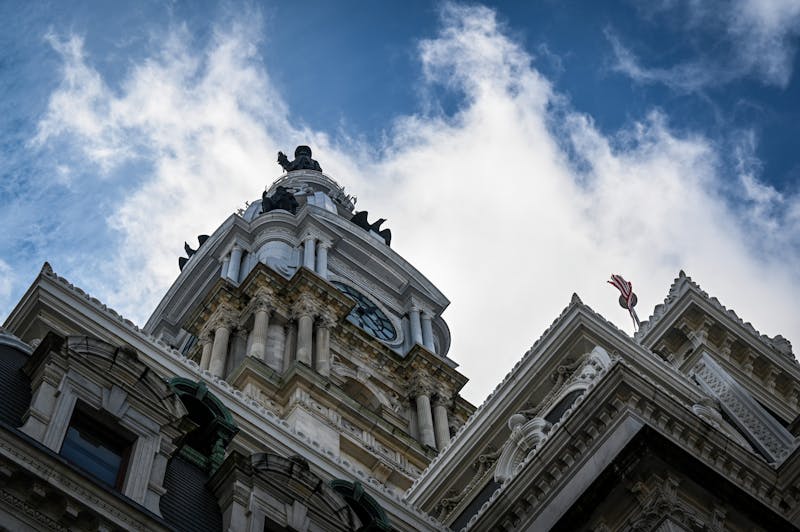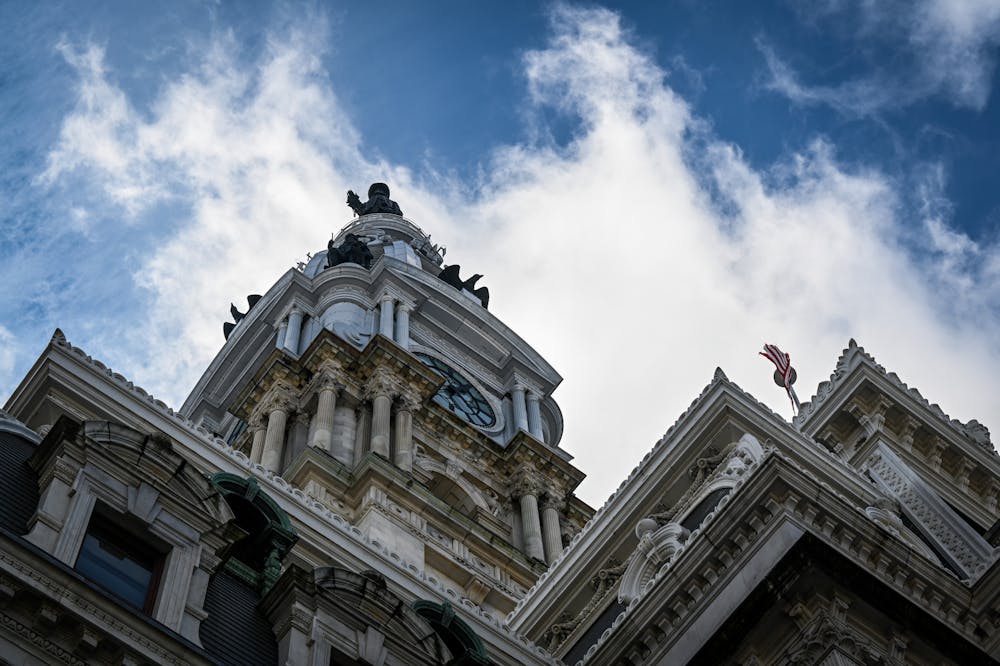City councilmembers, including those that represent University City, sent a letter to Penn urging respect for the researchers and postdocs union election.
Credit: Kylie Cooper
Members of Philadelphia’s City Council issued a letter on July 7 urging Penn to respect the rights of the University’s postdoctoral researchers and research associates seeking to unionize.
The letter, signed by eight councilmembers and addressed to Penn President Larry Jameson and Provost John Jackson Jr., called on Penn to honor a recent National Labor Relations Board ruling that granted postdoctoral researchers and research associates at Penn the right to vote on unionization in a July 16 and 17 election. The councilmembers urged the University to “refrain from any further legal challenges” and — in the event of unionization — “promptly bargain with them in good faith for a fair contract.”
According to first district Councilmember and letter contributor Mark Squilla, Councilmember Jamie Gauthier — who represents Philadelphia’s third district, including University City — requested to publicly express support for Research Associates and Postdocs United at Penn.
“[Gauthier] had reached out to see if any other councilmembers had interest in signing on to a letter to help support the efforts of having a vote to unionize there,” Squilla said in an interview with The Daily Pennsylvanian.
Along with Squilla and Gauthier, Councilmember Cindy Bass — along with at-large members Nina Ahmad, Kendra Brooks, Rue Landau, Nicolas O’Rourke, and Jim Harrity — signed the letter.
The councilmembers cited RAPUP’s upcoming election and their growing concern over what organizers called an “anti-union campaign” carried out by the University.
Due to “the challenge to the election coming up in July,” Squilla said that the councilmembers thought it was “imperative” for them, as “members supporting the unions,” to “reach out” and say “there should be a fair election.”
They criticized Penn’s legal response to recent organizing efforts by research associates and postdocs, which included initiating a hearing with the NLRB after a majority of eligible researchers signed union authorization cards and filed for an election in April 2024.
The councilmembers wrote that the hearing delayed and potentially denied workers the right to vote, and compared the University’s legal arguments to those used “to weaken workers’ rights” by employers such as Whole Foods.
Ahmad — who participated in a postdoctoral fellowship at Thomas Jefferson University — described feeling “intimately” aware of the benefits of unionization in an interview with the DP.
“I am deeply supportive and understand the need,” Ahmad said. “Postdocs particularly are very much overlooked, overworked, [and] underpaid.”
She also said that, despite the “overwhelming” support for unionization among workers, the University has opted to “silence students, particularly international students.”
According to Squilla, Penn’s administration has not directly explained its opposition to the union effort, especially given the University’s existing relationships with other labor groups.
Ahmad suggested that Penn’s resistance may be financially motivated, emphasizing the “cheap labor” offered by postdocs and research associates.
“They … [bring] in billions of dollars to the University,” Ahmad said. “All these proposals for grants, guess who writes them? Mostly postdocs. The principal investigators are not in the labs. It’s the postdocs who are actually managing in that space.”
Ahmad also raised concerns about the future of Penn’s relationship with the City Council, particularly as it relates to what the University “needs and wants” from the city.
“We could have a critical eye on some things that they need,” she said. “They need collaboration with us.”
Squilla also noted that the University failed to explain its motivations — despite the extensive relationship between Penn and the City Council.
“[Penn] didn’t reach out to us and say, ‘hey, this is the reason why we’re fighting this’ or ‘this is the reason why we believe we should maybe hold off the vote at this time,’” he said. “If they have a really good reason, then they should share that.”
The letter emphasized that unionization contributes to “a stronger and more prosperous city and commonwealth,” and highlighted the importance of job security, fair salaries, and benefits for University researchers.
The councilmembers also addressed Penn’s use of institutional resources to delay the union process, referencing the broader national instability around research funding.
“It would be disappointing to see Penn expend additional resources delaying workers’ democratic rights when research institutions, public officials, and workers are in a fight together to defend the research enterprise itself,” the councilmembers wrote.
In response to the letter, RAPUP emphasized its gratitude for the widespread support of unionization, including among Philadelphia legislators.
Sign up for our newsletter
Get our newsletter, DP Daybreak, delivered to your inbox every weekday morning.
“We, as postdocs and research associates at Penn, agree that we share a mutual interest with Penn administration in sustaining Penn’s research enterprise in the face of recent attacks on research funding,” Will Drayer — a postdoc researching material science engineering — wrote in a statement to the DP on behalf of RAPUP. “With our union, we will be joining over 100,000 academic workers also affiliated with the UAW in a broad movement to make the academic workplace more just, fair, and equitable.”
The councilmembers concluded their letter by reinforcing that they “believe it is in the mutual interest of the Penn administration, Penn Postdocs and Research Associates, and the City of Philadelphia for the Penn administration to respect researchers’ democratic choice.”
“Being from Philadelphia, we’re a pretty strong union town,” Squilla said. “We believe in these rights.”
The Daily Pennsylvanian is an independent, student-run newspaper. Please consider making a donation to support the coverage that shapes the University. Your generosity ensures a future of strong journalism at Penn.

